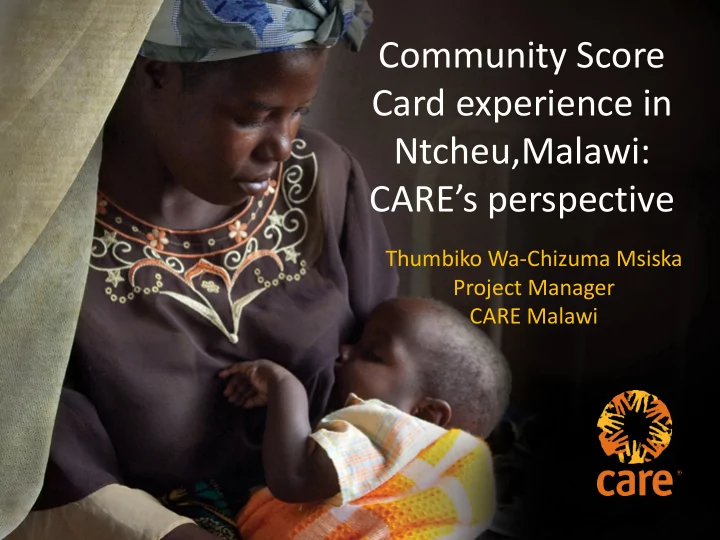

Community Score Card experience in Ntcheu,Malawi: CARE’s perspective Thumbiko Wa-Chizuma Msiska Project Manager CARE Malawi
Presentation Outline 1) Malawi Background 2) Background on project utilizing the Community Score Card (CSC) in Malawi 3) Introduction to the social accountability approach – CSC- CARE and the MOH using to ensure rights in Ntcheu, Malawi 4) How has the CSC helped fulfill, protect and respect rights in Malawi? 5) The challenges and complexities of using CSC in Malawi?
Malawi Background 15.3 million people 2013 pop projection 2.8% Annual population growth 5.7 Total Fertility Rate 10.6% HIV prevalence 71% Births by skilled Attendant 68% Coverage for PMTCT 42% Contraceptive Prevalence Rate Sources: Malawi DHS 2010, 2008 Census. Photos by Angeli Kirk, Gunnar Salvarsson, Karl Mueller
Maternal Health Alliance Project Maternal Health Alliance Project ( 2011-2015) Location: Ntcheu district, Malawi Supported by Sall Family Foundation Goal: develop & test broadly applicable approaches to improve family planning and maternal health implementation and outcomes. Target: Intervention: Community Score Card (CSC) -10 intervention health facilities w/ catchment communities social accountability approach innovated by --10 control CARE in 2002
Community Score Card A social accountability approach that brings together community members, service providers, and local government to identify service access, utilization and provision challenges, and to mutually generate solutions, and work in partnership to implement and track the effectiveness of those solutions in an ongoing process of improvement Underlying Rights Based Principles Participation and inclusion of voice Accountability and transparency Equity Shared responsibility
Methodology Indicator PHASE I: PLANNING AND PREPARATION Score Sample Reasons for Score Ambulance is rarely available in cases of 1- Referral system – availability of transportation for 45 emergency Providers make clients use pregnant women from health center to hospital PHASE II: Conducting the Score PHASE III: Conducting the public transport Card with the Community Score Card with Service Long distance to health facility Sometimes 2- Availability of transport from the community to the 20 Providers women delay doing to the facility during health facility delivery HIV test kits stock outs occur regularly 3- Availability of resources (i.e. drugs, supplies, space) 50 Repeat cycle Clients told to buy medication which should be free PHASE IV: Interface Meeting and Action Planning Most service are available FP long acting 4- Availability and accessibility of health services 80 term methods provided rarely No MNH (MNH, FP, PMTCT) services provided in community The messages are only available at the 5- Availability and accessibility to information 80 health facility not in the community Few men accompany their wives to 6- Level of male involvement in MNH, FP, PMTCT 50 antenatal care Most men refuse HIV test There are no youth clubs so most youth 7-Level of youth involvement in reproductive health 10 have little information on family planning, issues MNH or youth friendly services Local gov’t & Some health workers have good attitudes 8-Reception of clients at the facility 40 Catchment Community decision makers Health providers and respect clients Some women are shouted at during delivery There is no health advisory committee or 9- Relationship between providers and communities 40 village health committee Meetings PHASE V: Action Plan Implementation and M&E between health providers and clients is rare
How has the CSC helped fulfill, protect and respect rights? • Created space for engagement between the • Enhanced collaboration - Wide range of service providers and users stakeholders at interface including government structures • Enhanced communities knowledge and demand for entitlements in a subtle manner- Provided practical and negotiated ways for • starting from the analysis of issues hindering engagement of various stakeholders at different delivery and accessibility of services. accountability levels and strengthened decentralization - Community, Health Center, • Enhanced the culture of accountability among District and Policy level providers in a negotiated manner • Enhanced knowledge of District managers on • Enhance collective responsibility to address local issues affecting service utilization and barriers to delivery and utilization of quality delivery- leading to redistribution of staffing and service. resources based on need
Improvements in Score Card Indicators Kasinje Health Facility (ex. Relationship between providers and communities) Score Score Indicator Score Jun 2013 Dec 2013 Dec 2012 1- Referral system Mochocho 2- Availability of transport from the community to the HF 3- Availability of resources (i.e. drugs, supplies, space) Chiwfiri 4- Availability and accessibility of health services 5- Availability and accessibility to information 6- Level of male involvement in MNH, FP, PMTCT Yesaya 7-Level of youth involvement in reproductive health issues 8-Reception of clients at the facility 9- Relationship between providers and communities
Improved relationship and communication between service users and providers increased demand for services 90 80 70 60 Relationship between users and providers 12-Dec 50 Relationship between users and providers 13-Jun 40 Relationship between users and providers 13-Dec 30 20 10 0 Health Workrs Mchocho Chifwiri Yesaya
The challenges and complexities of using CSC? • Potential to be destructive if not properly handled-managing emotions vs building relationships • Constrained resource environment (human and material) failing to meet the generated demand • Culture of protecting domains of power/influence especially among power holders – resistant to creation of spaces for negotiation • Limited policy influencing due to following the small evidence base- only one of the 28 districts covered • Chiefs/committees being gatekeepers on who participates in the CSC
For more information contact: Michael Rewald CARE Malawi Country Director mrewald@co.care.org Thumbiko Msiska MHAP Project Manager thumbiko.msiska@co.care.org
Recommend
More recommend